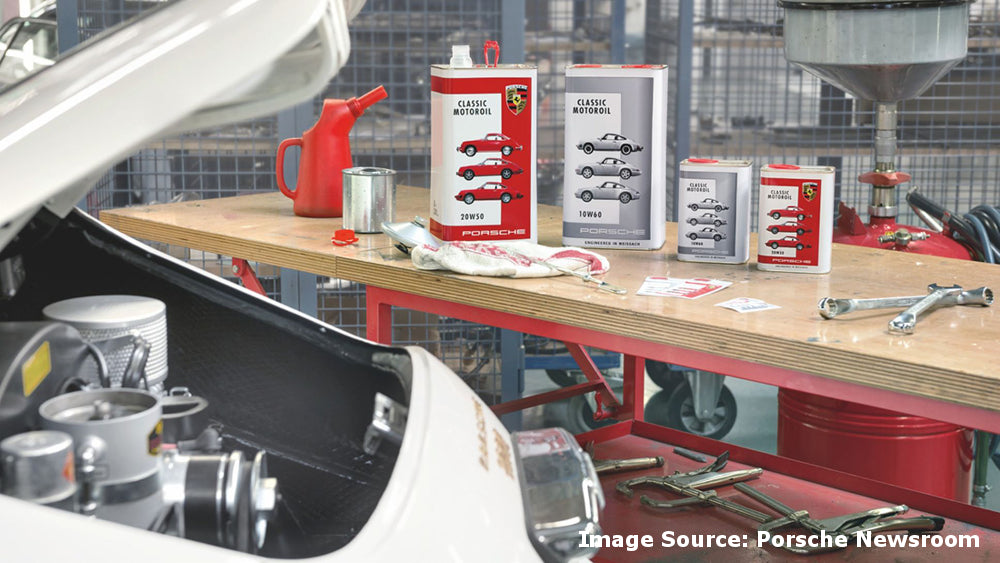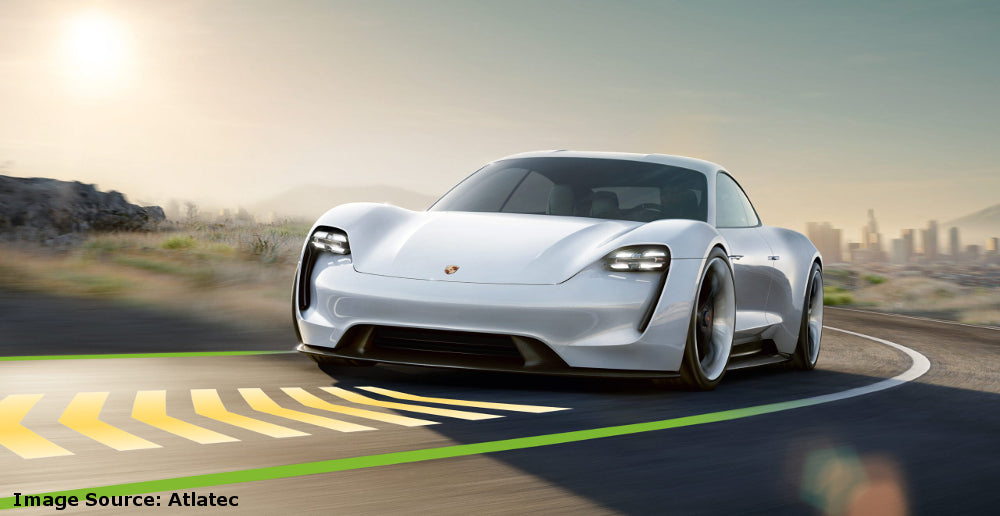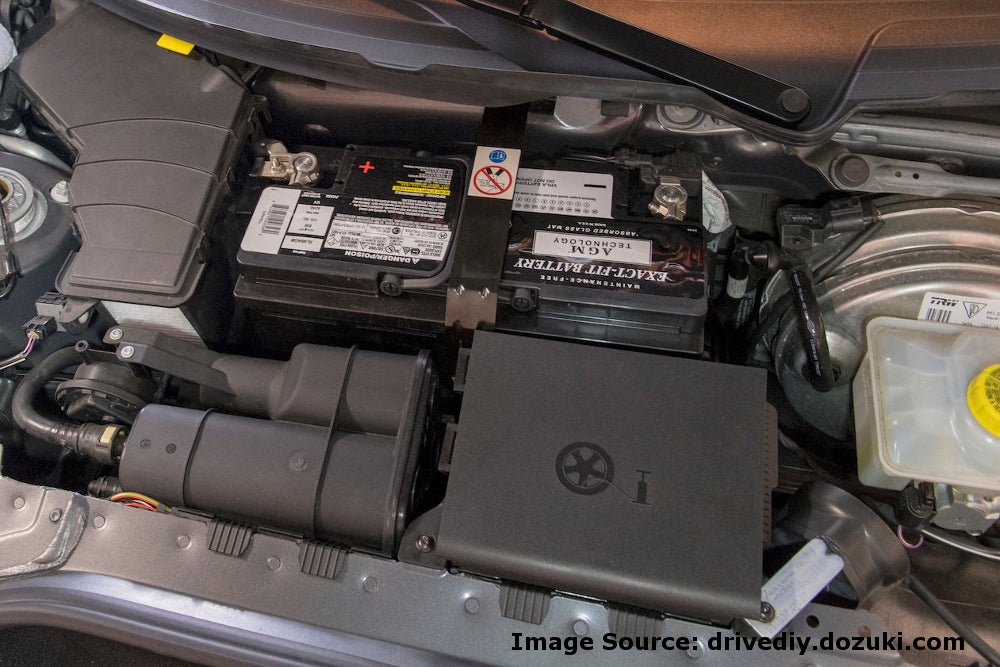In this article we explain the important differences between various types of engine oils and how to select the best engine oil for your Porsche.
At the heart of every Porsche nestles a beautifully crafted engine. From the air-cooled flat sixes to the monster turbo-charged V8s these brilliantly engineered masterpieces have gained a reputation, not only for their performance but also their legendary reliability and long-life. But, to keep these engines performing at their best they need oil. Not any old oil, but a lubricant that satisfies all the considerable demands of a high performance engine.
There was a time, not too long ago, when all you had to worry about when selecting your motor oil was the viscosity (the 10W-50 part) and the service category (the SG part in the API classification). For the rest you did not have a choice and oil was oil.
Today that has all changed: Yes, the viscosity and classification are still important but now you also have a choice of mineral or synthetic oil. Not only that, but you can also choose between fully synthetic (the base stock is synthesized), and mineral based synthetic oil (an ultra-refined or “hydrocracked” crude derived oil).
What is more, with the introduction of catalytic convertors that are lead and zinc-intolerant, most modern engine oils have had to forego additives such as zinc dialkyldithiophosphate (ZDDP) and lead that were vital to lubricating the valve-gear in many of the older high-performance engines – such as Porsche’s flat air-cooled engines equipped with “flat-tappet” camshafts.
So with all these options what oil should you use in your Porsche? To help you make an informed decision it might be worth taking a more detailed look at the different types of oils and the benefits and drawbacks of the two major groupings – mineral based oils and modern fully synthetic lubricants.
What Are Mineral Or Crude Based Oils?

Mineral or crude-based oils are categorized by the American Petroleum Institute (API) as either Group I, II or III – a rough indication of the level of refining that the base oil has undergone.
These are the “traditional oils” and we all know they work. But with an increased focus on the environment and performance, many of these lubricants no longer fulfil every consumer’s needs.
Mineral oils are negatively affected by temperature. At low temperatures they tend to become very “thick”, resulting in a loss of efficiency in overcoming the additional “drag”, whilst at high temperatures the viscosity drops as the oil thins out, running a risk that lubrication could be compromised. At higher temperatures, they also oxidize more rapidly, meaning more frequent oil changes for demanding applications such as those found in air-cooled performance engines.
On the plus side, they are cheaper than synthetics, although Group III oils are very similar to synthetic oils in both performance and cost. In fact, the Society of Automotive Engineers actually allows these to be advertised as synthetic oils.
The Advantages Of Full Synthetic Engine Lubricants – And A Word Of Caution

These are API Group IV oils, often with polyalphaolefins (PAOs) as base stock, and are produced by synthesizing chemicals. The fact that they are man-made means they can be engineered with very specific properties.
Synthetic lubricants are very stable under a wide range of temperatures, which allows manufacturers to use thinner oils. In fact Porsche has been factory-filling its engines with 0W-40 oils since 1996. This in turn leads to improved engine performance and savings of up to three percent in fuel consumption.
Because these lubes are very stable under extreme loads and temperatures, Porsche specifies them for use in turbo-charged engines. With Turbo temperatures typically reaching about 900o Celsius (1600o Fahrenheit), mineral oils would require frequent replacement.
Additive packages can also be precisely engineered to meet specific operating requirements. This means that anti-foaming, detergent and anti-corrosive properties are often superior to those found in mineral lubricants.
Synthetic oils are also better for the environment by way of:
- Being produced from renewable sources
- Reducing fuel consumption
- Extending oil life, which means less oil to dispose of in the environment
A word of warning regarding extended oil changes: While the vehicle is under warranty the manufacturer’s service intervals have to be followed. It is also important to remember that any oil (mineral or synthetic) can be contaminated with dust ingress through the air filter, and mechanical-wear debris in the oil. As a result, it is important that the filters are changed at appropriate intervals.
The downside to using a synthetic lubricant is the initial cost, although the savings in parts and labor resulting from extended oil change intervals can offset this.
Another concern often cited by owners of older classics is the incompatibility of synthetic lubricants with older oil seals. Many of the early synthetic motor oils were ester-based and with some engine seals also ester-based, the seals tended to swell and soften, reducing the tensile strength and allowing oil to leak past the seal. The switch to PAOs has taken care of this problem.
However, there is a word of caution for owners of classics wishing to switch to synthetic oil. Although not directly a consequence of synthetic oil, the absence of ZDDP and lead in these lubricants poses a problem to earlier Porsche air-cooled flat engines that are equipped with flat-tappet camshafts. Without these ‘high-load’ additives the camshaft lobes are likely to experience elevated wear rates. It is therefore important that you take care when selecting engine oil for classic Porsche 356s and earlier Porsche 911s.
What Oil Should You Use In Your Porsche?

Before deciding on what oil to fill or top up your Porsche engine with, you should always refer to Porsche’s specifications and recommendations in the handbook.
The critical information you need to ensure you select the correct oil for your engine is:
- The viscosity of the oil.
- The service classification of the oil. For instance in the API taxonomy SN, the “S” confirms the oil is fit for use in spark ignition engines and the “N” verifies that the oil meets the requirements of engines built after October 2010. While newer service category oils generally provide backward compatibility to older service categories, it is not always the case – so always refer to Porsche’s requirements.
- On older Porsche classics you also need to determine whether your engine is compatible with synthetic oil.
Fortunately, the experts at Porsche Classic have developed a range of engine oils specifically formulated for the classic air-cooled flat engine. With the help of engineers at the Porsche Development Centre in Weissach and a German oil supplier Porsche Classic have developed a 20W-50 oil for 356, 914 and early air-cooled 911 models with a displacement of up to 2.7-liters. These oils have all been formulated to retain shear stability at high temperatures and, in older engines, will not affect the seals.
What is more, given that not every classic car is used for everyday travel, these vehicles are often parked for long periods and used only sporadically for short trips, making it more likely that engine components. Porsche Classic Motor oils have been developed to ensure classic cars are protected, even when the vehicle is not used for long periods.
The range has been extended to include a 10W-60 oil for air-cooled 3.0-liter 911 models, as well as a 10W-50 oil for Porsche 928, 924, 944, and 968 models and a 5W-50 oil specifically for 996 and Boxster type 986 models.
So whilst the range of engine oils continues to grow understanding how oils are classified and following Porsche’s recommendations can confidently select the best engine lubricant for your Porsche and the conditions it operates in.
Did you enjoy this article? Avoid missing future publications by subscribing to this blog's RSS feed using
https://frazerpart.com/blogs/technical-articles.atom




